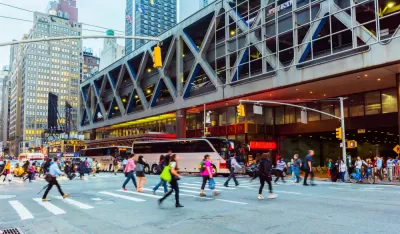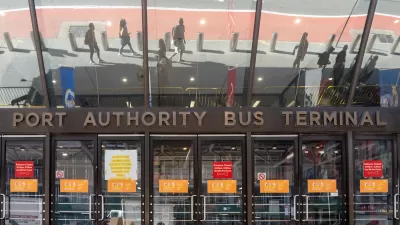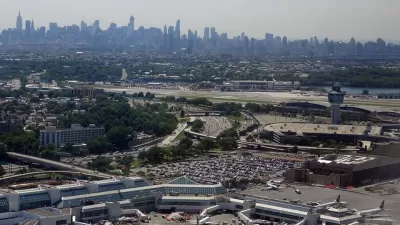The Port Authority Bus Terminal, described as the busiest bus terminal in the world, is due for a makeover, due to its "ragged" appearance and importance to the economy of the New York and New Jersey.

"New York and New Jersey are moving forward with plans to replace the world’s busiest bus terminal, and have homed in on three options for the new facility," reports Dana Rubinstein.
One would have the Port Authority of New York and New Jersey — which runs the bus terminal — rebuild it in place, while having buses continue to service the existing terminal during construction. In the second scenario, the Port Authority would convert the Jacob Javits Center’s lower level into an underground bus terminal. The third and final option is to relocate longer-haul intercity bus operations to the lower level of Javits, thereby freeing up capacity in the existing bus terminal for its primary customers: New Jersey commuters. That option allows for the terminal’s renovation, and obviates the need to rebuild it from scratch.
According to Rubinstein, Politico "obtained" the 180-page document laying out the plans for the new bus terminal, just a few weeks after the Port Authority launched the environmental review process for the project.
Like most projects in New York and New Jersey, there are political controversies and extremely high costs associated with this project, also detailed by Rubinstein in the article.
FULL STORY: New York and New Jersey to move forward with plans for a new midtown bus terminal

Trump Administration Could Effectively End Housing Voucher Program
Federal officials are eyeing major cuts to the Section 8 program that helps millions of low-income households pay rent.

Planetizen Federal Action Tracker
A weekly monitor of how Trump’s orders and actions are impacting planners and planning in America.

Ken Jennings Launches Transit Web Series
The Jeopardy champ wants you to ride public transit.

Rebuilding Smarter: How LA County Is Guiding Fire-Ravaged Communities Toward Resilience
Los Angeles County is leading a coordinated effort to help fire-impacted communities rebuild with resilience by providing recovery resources, promoting fire-wise design, and aligning reconstruction with broader sustainability and climate goals.

When Borders Blur: Regional Collaboration in Action
As regional challenges outgrow city boundaries, “When Borders Blur” explores how cross-jurisdictional collaboration can drive smarter, more resilient urban planning, sharing real-world lessons from thriving partnerships across North America.

Philadelphia Is Expanding its Network of Roundabouts
Roundabouts are widely shown to decrease traffic speed, reduce congestion, and improve efficiency.
Urban Design for Planners 1: Software Tools
This six-course series explores essential urban design concepts using open source software and equips planners with the tools they need to participate fully in the urban design process.
Planning for Universal Design
Learn the tools for implementing Universal Design in planning regulations.
Ada County Highway District
Clanton & Associates, Inc.
Jessamine County Fiscal Court
Institute for Housing and Urban Development Studies (IHS)
City of Grandview
Harvard GSD Executive Education
Toledo-Lucas County Plan Commissions
Salt Lake City
NYU Wagner Graduate School of Public Service





























